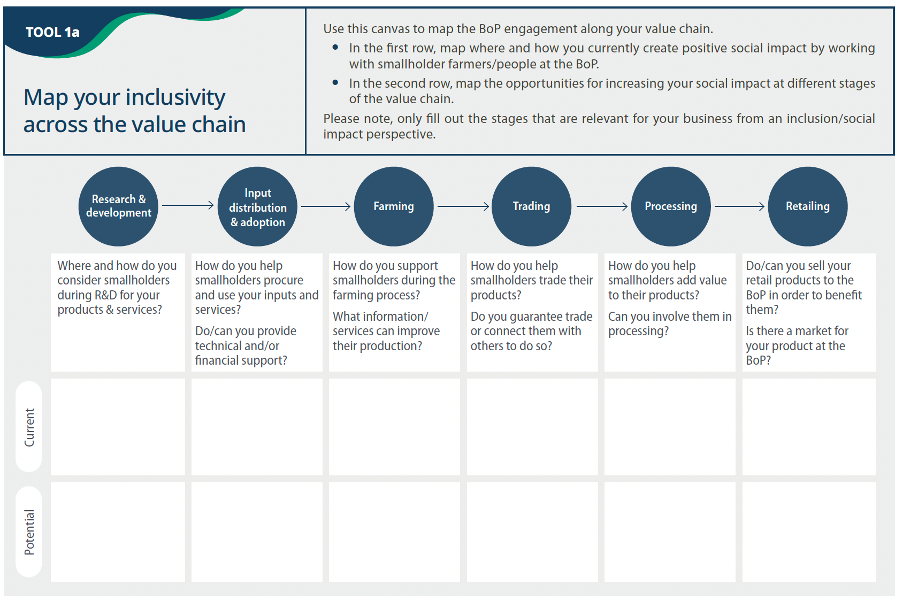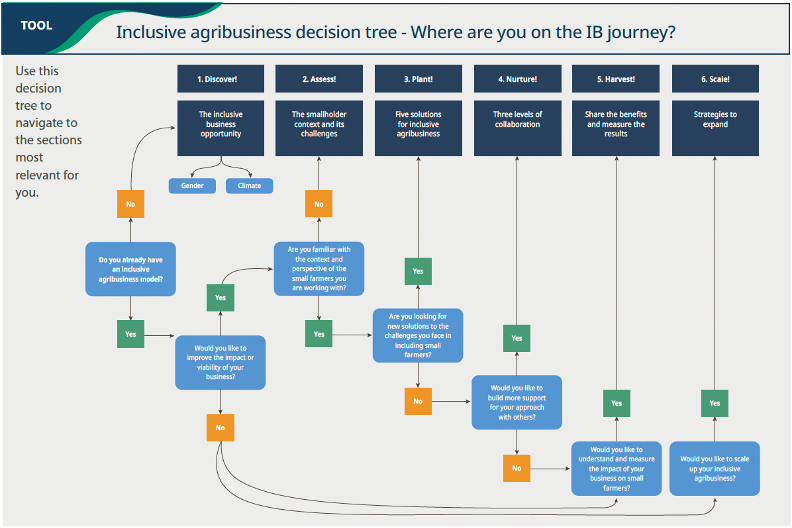Are you looking to make your agri-business more inclusive and profitable? The new inclusive agribusiness toolkit is made for businesses like yours! Based on more than 20 years of experience of companies working strategically with small farmers for mutual value, the toolkit takes you on the journey to identify opportunities with small farmers as business partners and, with them, build new markets, improve the quality of your raw materials, and reduce costs, risks and uncertainty. This comprehensive guide provides practical strategies, case studies, and tools to work effectively with small farmers for mutual benefit.
At Sid’s Farm, social impact isn’t a trade-off against financial return. Our collaboration with United Nations ESCAP to empower farmers has not only enhanced their economic and social outcomes but has also helped us optimize our supply chain costs and improve the quality of our milk. Inclusive business is not a compromise but an opportunity.”
– Dr. Kishore Indukuri, CEO Sid’s Farm
Agricultural markets are notoriously volatile in nature due a number of reasons such as weather conditions and natural disasters. In the last couple of years, they have become even more uncertain. Following the war in Ukraine and increasing fuel prices, the cost of agricultural products reached record highs in 2022.[1] Companies in the agri-food space have been struggling to keep up and guarantee their supply. In the face of volatile prices, working with local small farmers will help agribusinesses strengthen and maintain their supply chain by reducing costs, managing quality and ensuring guaranteed sourcing.
How do agribusinesses benefit from working with small farmers
“We believe good return on investment is achieved by long-term engagement with small-holding farmers with an inclusive approach of people & planet. Our supply chain is dependent on the availability of natural resources and on continuously improving livelihoods. Our competitive advantage in the market comes from our consciousness and preparedness towards ethical & responsible sourcing.”
-Syamala Gowri Lingala, Senior Manager Sustainability Jayanti Herbs & Spices
By sourcing from small farmers, companies can better meet growing food demands. 80% of the food in Asia is produced by small farmers. Working directly with small farmers helps your company address increasing traceability and transparency regulations related to global value chains. Lastly, consumers are more and more concerned with the health and local footprint of their choices. By supporting small farmers to adop sustainability practices you can benefit from improved reputation, higher value, increased brand recognition, customer and employee loyalty, and access to political decision-makers.[2]
Selling to small farmers can open a plethora of opportunities to build new markets for seeds, feed, fertilizer, plant protection products, irrigation systems,
Machinery, financial services and other production factors. Access to such inputs can help farmers generate greater yields and manage risks. Both companies and farmers can increase their resilience to risks such as climate change, pests and drought.
The first step for companies is to identify opportunities to engage better with small farmers along their value chains. The mapping tool below can guide your assessment.

Grow your inclusive business!
Growing an inclusive agribusiness is analogous to cultivating a field: Companies discover an opportunity, assess local conditions and potential challenges, plant solutions, and nurture them with collaboration at various levels, harvest results and finally, look for opportunities to expand. Based loosely on our 2012 guide “Growing Business with Smallholders”, the toolkit provides a framework that identifies common challenges, highlights solutions and shows how these can be implemented through cooperation at different levels. Depending on where your company is on the journey, you might directly jump to specific sections in the toolkit.

Practical tools include:
- Mapping tools – for assessing current small farmer engagements, identifying opportunities, challenges, relationship and aggregation models, and mapping gender roles and the potential for climate smart agricultural practices
- Solutions tools– where can you conduct research and develop innovations, upgrade production factors, provide training and information, agree on and enforce rules, and/or strengthen relations within the value chain to address current constraints?
- Checklists – for determining if collaboration with others can support your business model, for measuring results and for scaling inclusive businesses
- Worksheets – for understanding how benefits can be shared
- Case studies – giving real life examples to inspire you in different areas such as gender, climate smart agriculture, farmer communities, partnerships, sourcing hubs and more to show you what is possible, detailing the interventions, the approaches used, benefits and impact
The role of inclusive business coaching in helping businesses grow
While companies can use the toolkit independently, it is often beneficial to have an experienced advisor. Such coaching was part of Endeva’s collaboration with the United Nations ESCAP, where 27 companies across India and Viet Nam received tailored inclusive business coaching from our local partners Ecociate and WeCreate.

For example, thanks to the coaching they received, Sid’s Farm, a dairy company in India, e moving beyond procurement to directly support their small farmers, most of whom are women. Initially, Sid’s Farm focused mainly on buying, testing and selling the milk they procured. Since joining the programme, the company has started tracing back milk that underperforms in the tests, and helping dairy farmers address low productivity and quality issues by providing them with veterinary services. Additionally, Sid’s Farm has established dairy collection centers to continue collecting and testing the milk. They train and empower women to be in charge of the collection centers. Sid’s Farm also pays their farmers 5-6% more than other companies and provides them with just received 10 million USD in impact funding to scale up their operations, also thanks to the progress they made in the coaching.
At the end of the program, all of the companies reported that their operations had scaled up, they were working with more farmers, labour productivity was up. Most reported incorporating gender inclusivity as a strategy, having seen the benefits of working with recognizing women along their value chains and working with them even better. Several of the Indian companies raised funding through impact investing, together amounting to over 20 million USD, having leveraged the lessons learned through the coaching programme
Conclusion: Create a stronger business with small farmers
In conclusion, partnering with small farmers strengthens agribusinesses by securing supply chains, meeting sustainability demands, and improving livelihoods. The “Grow Your Inclusive Agri-Business Toolkit” provides practical tools and insights to foster inclusive practices, create mutual value, and drive sustainable development. Embrace this opportunity to transform your business and make a lasting impact.
📖 You can start your inclusive business journey by reading the full version of the toolkit here.
🧑🌾 If you would like to get advice on how to work with smallholder farmers, you can get in touch with Christina Tewes-Gradl (c.gradl@endeva.org).
🌏 If you are based in India or Viet Nam, and you need coaching support in growing your inclusive business, you can reach out to our locally based partners Ecociate (santosh@ecociate.com) and WeCreate (hoai.wecreatevietnam@gmail.com).
🎉 To learn more about how an inclusive business accreditation system can recognise and incentivise inclusive businesses, read our blog post on the UN ESCAP’s Inclusive Business Accreditation Manual we co-authored.
📗 This toolkit is based on the Grow Your Business with Smallholders guide we authored for GIZ.
_________________
Footnotes:
[1] Food and Agriculture Organization of the United Nations. 2023. World Food Situation. https://www.fao.org/worldfoodsituation/foodpricesindex/en/
[2] International Finance Corporation. 2022. Building Resilient, Equitable and Sustainable Food Systems in Asia. https://www.ifc.org/wps/wcm/connect/news_ext_content/ifc_external_corporate_site/news+and+events/news/resilient-equitable-sustainable-food-systems-asia


